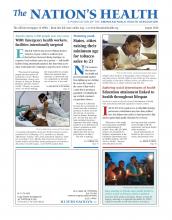Every once in a while, life may throw some stressful curve balls your way. Those curve balls may be scary events, such as surviving a car crash or natural disaster.
It’s normal to feel on edge after a traumatic life event. But if the stress from that experience makes it harder for you to carry on with your daily life, it may be a sign of a larger health issue: post-traumatic stress disorder.
PTSD is marked by intense feelings of fear that continue long after witnessing or experiencing a traumatic life event.
“It’s sort of natural to feel fear and afraid during and after some sort of traumatic situation,” says Farris Tuma, ScD, MHS, program chief of the traumatic stress research program at the National Institute of Mental Health. “In fact, this fear sort of triggers quick changes in our body that are helpful for responding to dangers and helpful for avoiding those dangers in the future. For most people it sort of fades. But if they persist for weeks and into months and beyond they might be considered to have PTSD. They feel stressed and afraid even when they’re no longer in danger.”
Anyone can develop PTSD, particularly veterans exposed to combat, victims of physical and sexual abuse and assault, and victims of events such as car crashes, disasters and terror attacks, Tuma says.
While experiencing a traumatic event is a risk factor for developing PTSD, so is having little to no social support to cope with the trauma, as well as an existing history of drug and alcohol use and mental health issues, such as anxiety, Tuma says.
“Seven or eight out of every 100 people in the U.S. will experience some aspect of PTSD in their lifetime,” Tuma says. “It’s very common, if you will, in terms of other mental disorders.”
Signs of PTSD include a month or longer of symptoms such as flashbacks to the trauma or persistent unwanted thoughts about the event, staying clear of places and feelings that remind you of the event, being easily agitated and having difficulty remembering details of what happened.
Flashbacks may include bad dreams or thoughts during the day that cause you to feel as if you’re still in danger, including physical symptoms such as sweating or racing heart, Tuma says. Being easily agitated or startled may also coincide with having trouble getting a good night’s sleep.
In addition to trouble remembering events, your mood often worsens to include negative thoughts about yourself in the world.

Photo by Cathy Yeulet, courtesy iStockphoto.
“You’re feeling detached, not who you used to be, maybe feeling intense guilt or blame — like this was your fault — and have little interest in enjoyable activities,” Tuma says.
If a dangerous or scary life event continues to affect how you function in day-to-day life, arrange to talk with a health care provider about your symptoms. If you’re diagnosed with PTSD, a care provider will be able to direct you to mental health care professionals whose treatments may include talk therapy, medication or a combination of both, Tuma says.
Talk therapy can educate you about your symptoms, evaluate how they affect your social life and provide you with skills to cope with your feelings. And medications prescribed by a licensed mental health professional can help relieve symptoms such as depression linked to PTSD.
Other benefits of therapy may include tips on healthy sleep habits, exercise and diet as well as help with focusing on how you react to and manage symptoms so that they may fade in intensity.
“Not everyone has the same configuration of symptoms and problems that show up,” Tuma says. “It’s often a matter of talking with health care providers and talking about options. Talking with your provider about trying different treatments may be necessary to see what works for your individual symptoms.”
Looking out for friends, family
If you believe a family member or friend may have PTSD, Tuma says the first thing to do is make sure they get the right diagnosis from a health professional. The right diagnosis means she or he will learn what their symptoms mean and that they don’t have to suffer alone.
Because people with PTSD may be more prone to avoid their issues, you should also play an active role in a loved one’s health care. Help them schedule medical appointments, accompany them on visits with health professionals and encourage them to stick with treatments. Providing emotional support can be an important part of recovery.
If someone makes comments that make you concerned for their well-being, don’t leave them alone. Call 911, or take them to a hospital emergency room. You can also call the National Suicide Prevention Lifeline at 1-800-273-8255.
For more information on PTSD or to find help, visit www.nimh.nih.gov
- Copyright The Nation’s Health, American Public Health Association









